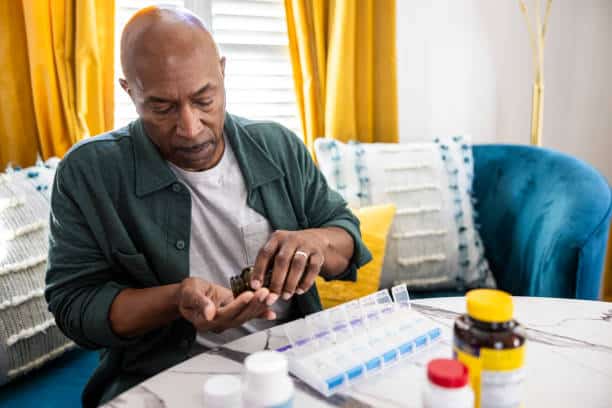
Psoriasis can be unpredictable. Even if you are taking all your medications correctly, you can experience unexpected flare-ups. The good news is, dietary changes, supplements, and alternative therapies can help improve the health of your skin and even reduce the risk of developing joint pain and other complications.
Vitamins and supplements, in particular, can help with the following, Verywell Health notes:
- Reduce inflammation
- Improve immune function
- Promote healthy skin
- Reduce nutritional deficiency
- Compensate for unbalanced dietary habits
Here are four vitamins that you should consider taking to help you combat your psoriasis symptoms.
Vitamin D & Psoriasis
If you have psoriasis, you may want to get your vitamin D levels checked.
Many dermatologists prescribe supplemental oral and topical vitamin D to treat nail and scalp psoriasis, flatten thick psoriasis patches, and slow skin cell growth to prevent itchy, scaly skin, according to Verywell Health.
New research suggests that blood levels of the so-called “sunshine vitamin” may affect the severity of your condition. In psoriasis, skin cells build up and form dry, itchy, sometimes painful patches.
For the study, researchers analyzed 491 cases in a U.S. national health and nutrition survey, including 162 from 2003 to 2006 and 329 from 2011 to 2014.
RELATED: Top 5 Beauty Hacks For Psoriasis
Their analysis found that lower vitamin D levels and deficiency were significantly associated with more severe psoriasis.
Patients with the highest average vitamin D levels had the least amount of psoriasis-affected skin. Those who had the most affected area had the lowest average vitamin D levels.
The amount of vitamin D a person would need to consume isn’t clear.
“While we can’t talk about the optimal vitamin D intake, there are current recommendations regarding safe amounts of vitamin D supplementation to avoid toxicity,” Lim says. “People may want to speak to their doctors about starting vitamin D supplementation safely.”
There could also be other contributors to a person’s psoriasis. Skin pigment inhibits vitamin D synthesis, Lim says. And psoriasis affects many people with darker skin tones.

While it appears vitamin D will improve a person’s psoriasis, it can also help with some associated health issues, including diabetes and high blood pressure, Hooper shares.
Sunshine is a major source of vitamin D, but it’s not safe to get all the vitamin D you need from the sun, because its UV rays can cause skin cancer.
And, Hooper said, although a person might be able to get enough of the nutrient through diet, “the best way to consume vitamin D is to take a supplement.”
Some foods that contain vitamin D are fatty fish, like salmon and mackerel, and egg yolks. Some fortified foods like cereal, milk and orange juice also contain the nutrient.
But, be aware that food sources can be unreliable because how much vitamin D a particular food contains may vary. Ultraviolet B (UVB) light therapy is also used to treat psoriasis because it can increase vitamin D levels in the body.
RELATED: Home Remedies For Psoriasis

Other vitamins that are good for managing psoriasis symptoms
Vitamin E
Vitamin E is a fat-soluble vitamin that acts as an antioxidant in the body. This vitamin can protect your cells from damage and reduce inflammation. Although vitamin E can improve symptoms, reduce itching, redness and inflammation, many people with psoriasis have a vitamin E deficiency.
Vitamin A
Vitamin A is a fat-soluble vitamin that plays a role in maintaining healthy skin and supporting the immune system. Vitamin A can be consumed through your diet in the following ways:
- Retinoids. Found in animal-derived foods such as meat, fish, and dairy
- Caroretinoids. Provitamin A: Found in plant-based foods such as fruits and vegetables
Many people living with psoriasis are also deficient in vitamin A. This contributes to the development of the disease and increases the risk of fungal infections on the skin. Dermatologists often prescribe retinoids derived from vitamin A to treat severe psoriasis, slow the growth of skin cells and reduce redness and swelling.
If you are pregnant, you should talk to your healthcare provider before taking vitamin A supplements. Research shows that retinoids are linked to congenital abnormalities and are considered unsafe to use during pregnancy.
Vitamin B12
Vitamin B12 is a water-soluble (dissolved in water) vitamin. It plays an important role in forming red blood cells, protein metabolism, and maintaining nervous system function.
When applied directly to the skin, topical vitamin B12 cream can soothe itchiness and reduce the redness and swelling of psoriasis patches on the skin. If you aren’t getting enough B12 through your diet, you may also benefit from supplements.
When to see a dermatologist
If you have psoriasis and haven’t received medical care, Hooper recommends seeing a dermatologist. Psoriasis can affect your daily life and potentially interfere with sleep.
A variety of treatments are available, including creams, light therapy and both oral and injectable drugs.
“It’s evolving constantly, which is great because it’s a common disease and it’s super frustrating and it’s associated with real systemic problems,” Hooper says.
You should also talk to your healthcare provider before taking any vitamins or other dietary supplements, especially if you are currently taking medications to manage psoriasis or other health conditions. Your healthcare provider will help you determine which vitamins and supplements are good for you and advise you on the potential side effects and interactions of the supplements you are considering.








